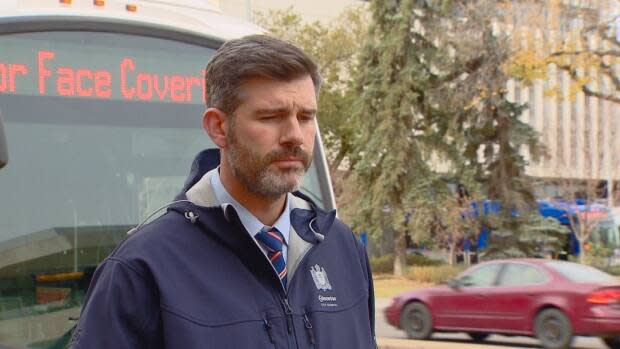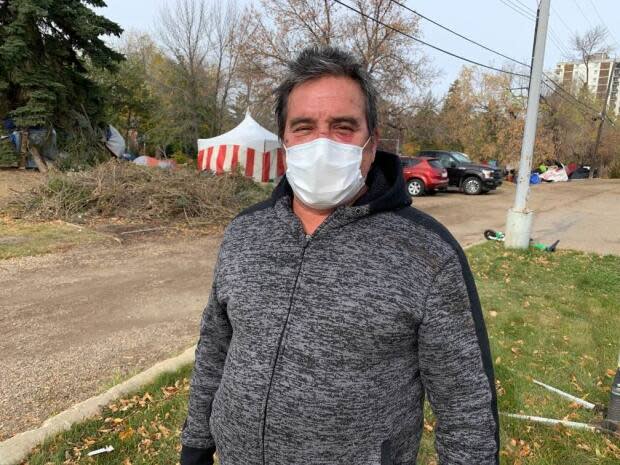Old Strathcona homeless camp to close as Edmonton announces temporary shelter
The organizers of an Edmonton homeless encampment say it will voluntarily close after the city announced a plan to convert part of a downtown convention centre into a temporary shelter by the end of the month.
Peace Camp first set up tents in Dr. Wilbert McIntrye Park at the beginning of September before moving three blocks north to Light Horse Park under the city's threat of eviction.
Camp organizers say they wanted to raise awareness about supportive housing and push the government to introduce a safe supply of drugs to prevent overdoses in the Old Strathcona area.
Cameron Noyes, the local advocate behind the camp, said organizers decided Sunday that volunteer fatigue and a lack of harm reduction supplies made the camp untenable heading into winter.
"It's become way too much for us to handle," Noyes said in an interview with CBC News on Tuesday.
"Fortunately it's a time when the city is stepping up a little bit. But we looked at the whole picture right now and decided we really had to close the camp. Now is the time."
The city announced Friday it intends to turn part of the Edmonton Convention Centre — formerly known as the Shaw Conference Centre — into a temporary shelter by the end of the month, as Mayor Don Iveson looks to make good on his 10-week plan to end homelessness by early November.
The mayor said the shelter buys the city, and other orders of the government, time to implement permanent solutions to homelessness come spring. He said the city will need federal money to acquire new housing units, with provincial support to provide health care on site.
"We're in hurry-up mode and we will have an opportunity for everyone who wants to come off the streets to do it within the 10-week window," Iveson said at a news conference Tuesday.

The convention centre shelter will stay open around the clock, the city says, with space for 300 people overnight and 400 people during the day. The city has committed to providing food, washrooms and shower services for people onsite, along with access to housing and health care support.
Peter Noivo, one of around 50 people at Peace Camp, said he plans to move to the shelter once it's open.
"It's a better solution and the weather is definitely demanding we do something," he said. "According to the people I've talked to in the camp, everybody is planning on that."
The plan for the convention centre comes months after the city closed temporary shelters at the Kinsmen Recreation Centre and Expo Centre, first set up at the outset of the pandemic.
But as with both Kinsmen and Expo, Noivo fears the convention centre shelter will close before he can find a home.
"You've got to have people having their place to live, to keep their IDs, to keep their stuff safe, that's basically the basic need of every human being," he said.
Camp Pekiwewin calls for detailed shelter plan
The city's decision to shutter the shelter at Expo in July without a clear backup plan galvanized community organizers to establish Camp Pekiwewin, the sprawling homeless encampment near Re/Max Field, unaffiliated with Peace Camp.
The Indigenous-led, anti-police camp provides meals, medical support and security to around 250 people, equivalent to a third of the people sleeping rough on any given night in Edmonton.
Shima Robinson, the camp's media liaison, says while the city's plan is encouraging, Pekiwewin organizers want more details about the breadth of services that will be offered, in particular mental health support.
"It has deep implications for the work we're doing because of course, we want people to get indoors and be warm in the winter," she said in an interview Tuesday.
"The last thing we want to do is tell someone to up and leave, get there and realize that they're in some ways much worse off. Right now we're just trying to clarify those issues."

While Peace Camp organizers plan to withdraw 24-hour support at Light Horse Park over the next week, their advocacy will continue, Noyes says. He plans to bolster his usual tours of the neighbourhood with more food and harm reduction supplies, while pressing the city to make good on plans for more permanent supportive housing.
Noyes said multiple requests for the city to provide fentanyl testing kits have gone unanswered despite his reports of increased overdoses in Old Strathcona. His account echoes an unprecedented province-wide surge in opioid overdose deaths during the pandemic, with 301 people dying between April and June.
"The city is going to have to do that because really it shouldn't be the community's responsibility to get that in the camp or on the street, that should already be there," he said.

